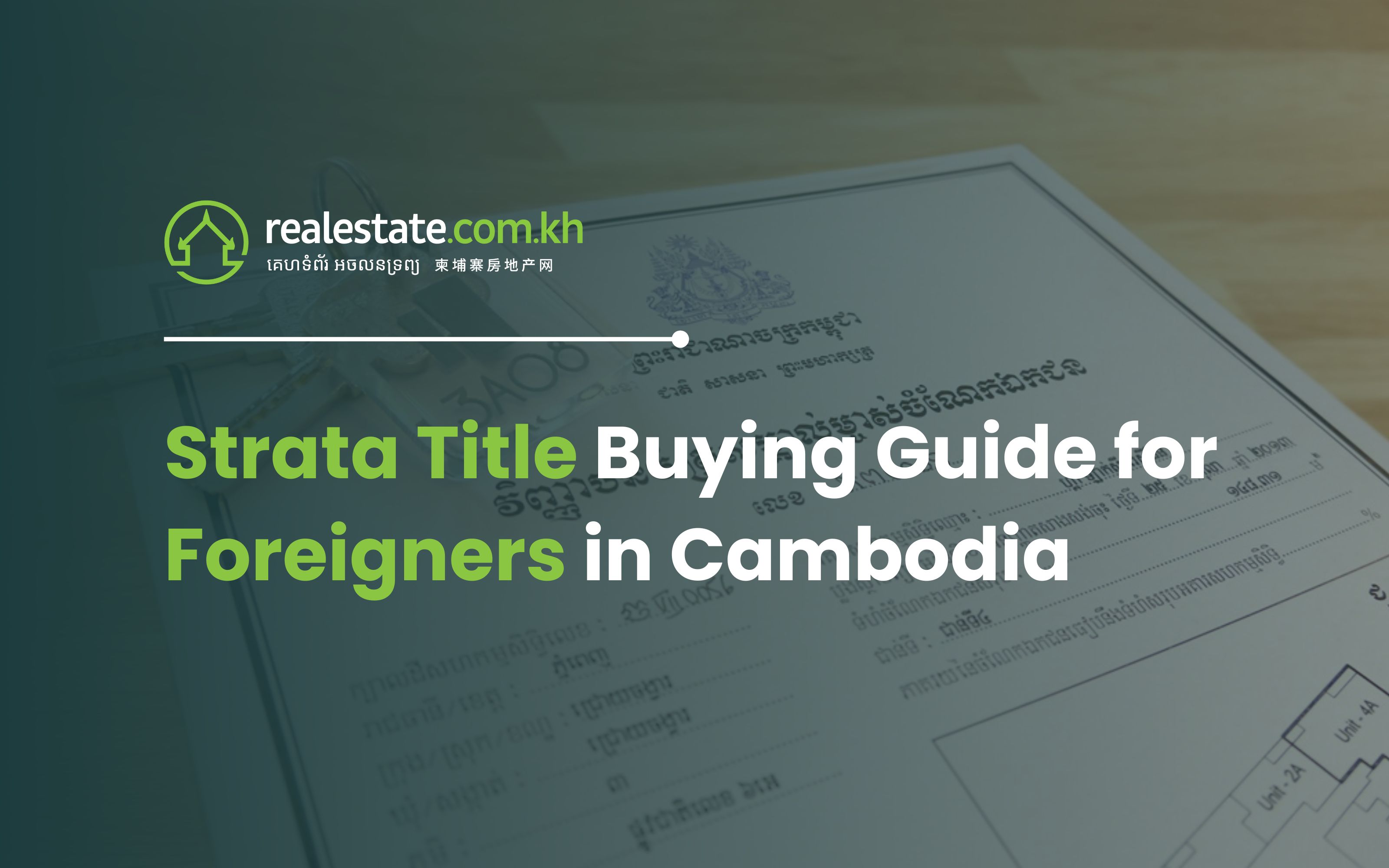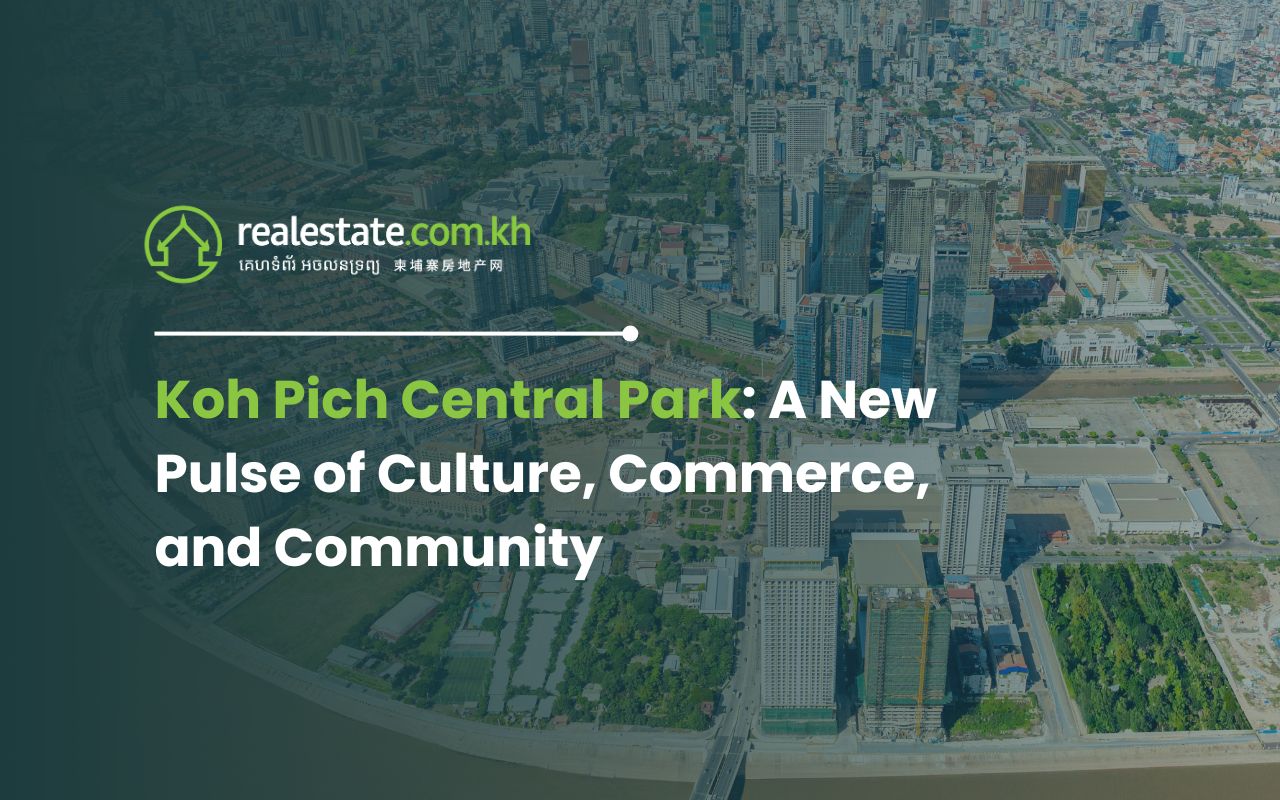Foreign direct investment (FDI) is luring a new breed of foreigners to Cambodia, and the region more generally. With foreigners comes an increase in demand for property, and different types of property - and a series of new allowances in national property laws to accommodate this demand.
 Foreign investors come to the South East Asia region for the low labour costs, connectivity between the neighbouring economies, and the huge supply of land, resources and business opportunities. And as local markets grow, FDI will naturally follow as international companies are spurred by the chance of jumping on the wagon of a fast moving economy.
Foreign investors come to the South East Asia region for the low labour costs, connectivity between the neighbouring economies, and the huge supply of land, resources and business opportunities. And as local markets grow, FDI will naturally follow as international companies are spurred by the chance of jumping on the wagon of a fast moving economy.
Foreign capital presents a huge engine of growth in South East Asian countries such as Cambodia, Vietnam, Myanmar and Laos - which cumulatively saw an average annual rise in FDI of 9.2 percent in the years 2010 to 2013. In this FDI growth, Myanmar was the leader of the pack with a 35.8 percent increase over the three year period. Cambodia followed with 22.3 percent; Laos came third at 15.2 percent; and finally, Vietnam, fell behind with just 2.6 percent growth over the three year survey.
Yet, amid the Cambodia, Laos, Myanmar and Vietnam bloc, foreigners are subject to a variety of ownership limits. The foremost of these is being barred from owning land on a freehold basis, otherwise termed as outright ownership in perpetuity. This is a rule which is largely steadfast throughout the four nations’ borders. This may not be surprising, however, as freehold possession of land is likewise unavailable to citizens of Laos, Myanmar and Vietnam, where government policy holds the state as the principal owner of all land.
Long-term leasehold is, therefore, the accepted form of land ownership for foreigners based in these nations. Lease terms are flexible for most purposes, whether it be for a new business property or a residential address, and allow room for ownership limits to potentially ease in the years to come as governments in the region increase efforts to attract quality FDI. Given the relative political stability in the region, investors are generally happy to accept these long term leases.
Cambodia, unlike its three neighboring counterparts, has a freehold land ownership system for its citizens. Foreigners based in Cambodia are also allowed rights of ownership over certain properties, subject to 2010 Law on the Provision of Ownership Rights. These rights, however, are restricted to buildings that have obtained a "strata title", which is available only to newly completed apartment buildings. According to the strata title regulation, foreigners cannot acquire a ground-floor unit legally, and any foreign ownership allocation is limited to a maximum of 70 percent of the units in any one co-owned building. Nevertheless, a foreigner lease term over landed properties can still be up to a 50 year maximum, with a 50 year renewal option included.
In Laos, land is owned by the "national community", meaning no individual or business entity, foreign or local, can truly own land. Land-use rights are only granted to individuals or organizations by the state, and these rights are able to be transferred or inherited. 50 year leases are commonly granted to foreign individuals or companies.
Myanmar's constitution similarly establishes the state as the ultimate owner of all land. Yet, under the new Myanmar Foreign Investment Law, an investor may lease land for up to 50 years, with two 10 year extensions. Structures affixed to land are the property of the foreign owner, but these rights revert to the lessor or the state with no prescribed compensation when the lease comes to an end.
A Condominium Law, likely inspired by the Cambodian example, that is currently in development in Myanmar but not yet in force, would allow a foreigner to purchase a condominium on the sixth floor or above of a co-owned building, up to a quota of 40 percent foreign ownership of the total units in the property.
In Vietnam, freehold ownership by foreigners over land is prohibited by the constitution. Yet state authorized leases between 50 and 70 years are widely available, especially for development projects, and renewable at the discretion of officials. Further, pursuant to the Vietnamese Law of Housing 2014, a foreigner may now own a unit in an apartment or condominium building - if it is a no-more-than 30 percent foreign owned building.
The influx of FDI and the relaxations upon ownership laws is pushing local real estate developers to create and sell more residential space suitable for the needs of this new investor class. The massive boom in construction in all of these countries, Cambodia’s condo explosion being a prime example, reflects this drive to meet a new FDI based market.
As rules are eased, companies such as property developers, banks and providers of property-related services, like maintenance, insurance and security, soon flow into the economy and boost it from within. In evidence of this, the GDPs’ of Cambodia and Myanmar each grew 9.7 percent last year; Vietnam's shot up by 8.8 percent; and Laos experienced 5.2 percent GDP growth.

 Foreign investors come to the South East Asia region for the low labour costs, connectivity between the neighbouring economies, and the huge supply of land, resources and business opportunities. And as local markets grow, FDI will naturally follow as international companies are spurred by the chance of jumping on the wagon of a fast moving economy.
Foreign capital presents a huge engine of growth in South East Asian countries such as Cambodia, Vietnam, Myanmar and Laos - which cumulatively saw an average annual rise in FDI of 9.2 percent in the years 2010 to 2013. In this FDI growth, Myanmar was the leader of the pack with a 35.8 percent increase over the three year period. Cambodia followed with 22.3 percent; Laos came third at 15.2 percent; and finally, Vietnam, fell behind with just 2.6 percent growth over the three year survey.
Yet, amid the Cambodia, Laos, Myanmar and Vietnam bloc, foreigners are subject to a variety of ownership limits. The foremost of these is being barred from owning land on a freehold basis, otherwise termed as outright ownership in perpetuity. This is a rule which is largely steadfast throughout the four nations’ borders. This may not be surprising, however, as freehold possession of land is likewise unavailable to citizens of Laos, Myanmar and Vietnam, where government policy holds the state as the principal owner of all land.
Long-term leasehold is, therefore, the accepted form of land ownership for foreigners based in these nations. Lease terms are flexible for most purposes, whether it be for a new business property or a residential address, and allow room for ownership limits to potentially ease in the years to come as governments in the region increase efforts to attract quality FDI. Given the relative political stability in the region, investors are generally happy to accept these long term leases.
Cambodia, unlike its three neighboring counterparts, has a freehold land ownership system for its citizens. Foreigners based in Cambodia are also allowed rights of ownership over certain properties, subject to 2010 Law on the Provision of Ownership Rights. These rights, however, are restricted to buildings that have obtained a "strata title", which is available only to newly completed apartment buildings. According to the strata title regulation, foreigners cannot acquire a ground-floor unit legally, and any foreign ownership allocation is limited to a maximum of 70 percent of the units in any one co-owned building. Nevertheless, a foreigner lease term over landed properties can still be up to a 50 year maximum, with a 50 year renewal option included.
In Laos, land is owned by the "national community", meaning no individual or business entity, foreign or local, can truly own land. Land-use rights are only granted to individuals or organizations by the state, and these rights are able to be transferred or inherited. 50 year leases are commonly granted to foreign individuals or companies.
Myanmar's constitution similarly establishes the state as the ultimate owner of all land. Yet, under the new Myanmar Foreign Investment Law, an investor may lease land for up to 50 years, with two 10 year extensions. Structures affixed to land are the property of the foreign owner, but these rights revert to the lessor or the state with no prescribed compensation when the lease comes to an end.
A Condominium Law, likely inspired by the Cambodian example, that is currently in development in Myanmar but not yet in force, would allow a foreigner to purchase a condominium on the sixth floor or above of a co-owned building, up to a quota of 40 percent foreign ownership of the total units in the property.
In Vietnam, freehold ownership by foreigners over land is prohibited by the constitution. Yet state authorized leases between 50 and 70 years are widely available, especially for development projects, and renewable at the discretion of officials. Further, pursuant to the Vietnamese Law of Housing 2014, a foreigner may now own a unit in an apartment or condominium building - if it is a no-more-than 30 percent foreign owned building.
The influx of FDI and the relaxations upon ownership laws is pushing local real estate developers to create and sell more residential space suitable for the needs of this new investor class. The massive boom in construction in all of these countries, Cambodia’s condo explosion being a prime example, reflects this drive to meet a new FDI based market.
As rules are eased, companies such as property developers, banks and providers of property-related services, like maintenance, insurance and security, soon flow into the economy and boost it from within. In evidence of this, the GDPs’ of Cambodia and Myanmar each grew 9.7 percent last year; Vietnam's shot up by 8.8 percent; and Laos experienced 5.2 percent GDP growth.
Foreign investors come to the South East Asia region for the low labour costs, connectivity between the neighbouring economies, and the huge supply of land, resources and business opportunities. And as local markets grow, FDI will naturally follow as international companies are spurred by the chance of jumping on the wagon of a fast moving economy.
Foreign capital presents a huge engine of growth in South East Asian countries such as Cambodia, Vietnam, Myanmar and Laos - which cumulatively saw an average annual rise in FDI of 9.2 percent in the years 2010 to 2013. In this FDI growth, Myanmar was the leader of the pack with a 35.8 percent increase over the three year period. Cambodia followed with 22.3 percent; Laos came third at 15.2 percent; and finally, Vietnam, fell behind with just 2.6 percent growth over the three year survey.
Yet, amid the Cambodia, Laos, Myanmar and Vietnam bloc, foreigners are subject to a variety of ownership limits. The foremost of these is being barred from owning land on a freehold basis, otherwise termed as outright ownership in perpetuity. This is a rule which is largely steadfast throughout the four nations’ borders. This may not be surprising, however, as freehold possession of land is likewise unavailable to citizens of Laos, Myanmar and Vietnam, where government policy holds the state as the principal owner of all land.
Long-term leasehold is, therefore, the accepted form of land ownership for foreigners based in these nations. Lease terms are flexible for most purposes, whether it be for a new business property or a residential address, and allow room for ownership limits to potentially ease in the years to come as governments in the region increase efforts to attract quality FDI. Given the relative political stability in the region, investors are generally happy to accept these long term leases.
Cambodia, unlike its three neighboring counterparts, has a freehold land ownership system for its citizens. Foreigners based in Cambodia are also allowed rights of ownership over certain properties, subject to 2010 Law on the Provision of Ownership Rights. These rights, however, are restricted to buildings that have obtained a "strata title", which is available only to newly completed apartment buildings. According to the strata title regulation, foreigners cannot acquire a ground-floor unit legally, and any foreign ownership allocation is limited to a maximum of 70 percent of the units in any one co-owned building. Nevertheless, a foreigner lease term over landed properties can still be up to a 50 year maximum, with a 50 year renewal option included.
In Laos, land is owned by the "national community", meaning no individual or business entity, foreign or local, can truly own land. Land-use rights are only granted to individuals or organizations by the state, and these rights are able to be transferred or inherited. 50 year leases are commonly granted to foreign individuals or companies.
Myanmar's constitution similarly establishes the state as the ultimate owner of all land. Yet, under the new Myanmar Foreign Investment Law, an investor may lease land for up to 50 years, with two 10 year extensions. Structures affixed to land are the property of the foreign owner, but these rights revert to the lessor or the state with no prescribed compensation when the lease comes to an end.
A Condominium Law, likely inspired by the Cambodian example, that is currently in development in Myanmar but not yet in force, would allow a foreigner to purchase a condominium on the sixth floor or above of a co-owned building, up to a quota of 40 percent foreign ownership of the total units in the property.
In Vietnam, freehold ownership by foreigners over land is prohibited by the constitution. Yet state authorized leases between 50 and 70 years are widely available, especially for development projects, and renewable at the discretion of officials. Further, pursuant to the Vietnamese Law of Housing 2014, a foreigner may now own a unit in an apartment or condominium building - if it is a no-more-than 30 percent foreign owned building.
The influx of FDI and the relaxations upon ownership laws is pushing local real estate developers to create and sell more residential space suitable for the needs of this new investor class. The massive boom in construction in all of these countries, Cambodia’s condo explosion being a prime example, reflects this drive to meet a new FDI based market.
As rules are eased, companies such as property developers, banks and providers of property-related services, like maintenance, insurance and security, soon flow into the economy and boost it from within. In evidence of this, the GDPs’ of Cambodia and Myanmar each grew 9.7 percent last year; Vietnam's shot up by 8.8 percent; and Laos experienced 5.2 percent GDP growth.





Comments